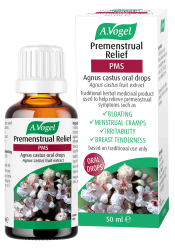An introduction to PMS symptoms
Symptoms of PMS (premenstrual syndrome) can be experienced by any menstruating woman. Those with the condition report symptoms occurring in a specific pattern during the two weeks between ovulation and the first days of their monthly menstrual bleed.
Many women experience a certain level of menstrual discomfort such as mild period pain, or have momentary episodes of feeling low with each monthly cycle. It is important to distinguish these normal menstrual symptoms from PMS which is only diagnosed when symptoms affect normal everyday activities and quality of life.
How common is PMS?
PMS is said to affect up to 80% of women at some point in their lives. It is more commonly seen between the ages of 20 and 40 and symptoms are said to be more severe when big hormonal changes are taking place such as after childbirth or before the menopause.
Symptoms of PMS may physical or psychological (emotional / behavioural). Over 150 have been described, but some are much more common than others. In general, a woman suffering PMS will experience the same set of symptoms each month.
However, this set will not be the same for each woman; while one may experience severe headaches and bloating during the two weeks leading up to their period, another may experience low mood and anxiety for three or four days before menstruation starts.
Physical symptoms
Physical symptoms of PMS commonly involve pain or discomfort in a specific area of the body. The most common of these are:
- Stomach cramps
- Painful breasts
- Headaches
- Acne
- Bloating or weight gain
- Digestive complaints
- Food cravings
- Sleeping poorly
- Feelings of restlessness
Symptoms may be so intense that the sufferer is unable to carry on with normal daily activities and may have to take time off work.
Many factors play a role and although the exact cause still eludes science, the part that hormones play is quite clear. Before menstruation, levels of the main female hormones oestrogen and progesterone change and these fluctuations affect the way the body works.
For example, changes in female hormones causes water retention, a feeling of being bloated and weight gain. Another example is that the male hormone testosterone (also present in small quantities in women) begins to rise, making you more prone to breast pain and skin problems.
These hormonal changes can also affect underlying health problems. PMS is associated with triggering or worsening conditions such as migraine headaches, cold sores, asthma, hayfever and epilepsy.
Psychological or emotional symptoms
Although unseen, many PMS sufferers find the emotional symptoms to be far more debilitating than any physical symptom experienced.
Psychological symptoms can make a sufferer feel like a completely different person, altering behaviour. Responses to everyday problems and minor inconveniences or stresses can become unpredictable and often more extreme than the situation really deserves.
Relationships with family members, partners, friends and colleagues can also come under strain.
Psychological or emotional symptoms of PMS include:
- Lowered self-esteem and confidence
- Poor concentration and memory
- Reduced ability to cope with stress
- Irritability
- Tendency to anxiety or panic
- Low mood or mood swings
Many of these symptoms can be worsened by any physical symptoms present. For example, having period pains can make one more irritable and less able to cope with stress.
Again, hormonal fluctuations during the menstrual cycle get the blame. It seems that mood and oestrogen go hand in hand, and when the level of this hormone drops just before menstruation, so does your mood and ability to cope.
My PMS Journal
Keep track of your symptoms with our PMS Diary to identify patterns & help discover ways to minimise them.








